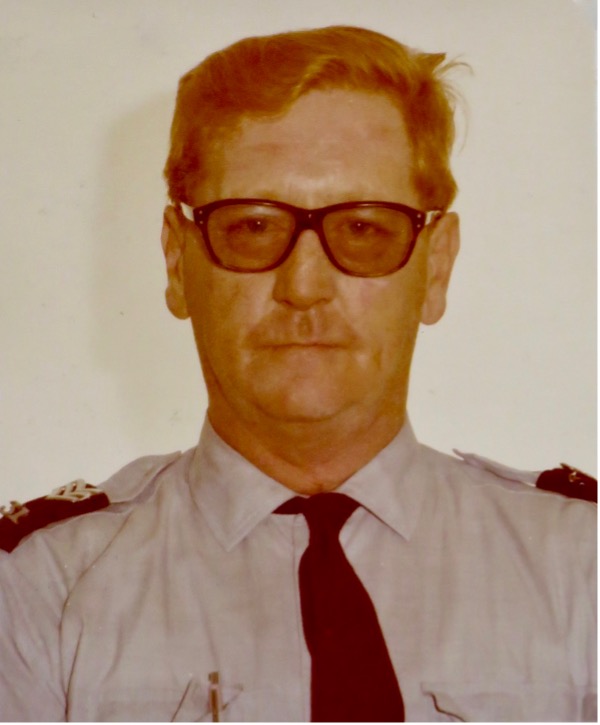 Sergeant Derek Fletcher
Sergeant Derek Fletcher
This biography of the Late Retired Sergeant Derek Fletcher has been compiled with the kind assistance of his son Rees and includes the contents of several articles written by Derek during his time serving in the Bermuda Police.
George Daniel “Derek” Fletcher was born in Tonteg, Llantwit, in South Wales on 8th January 1930. He was reared in Reading, Berkshire, attending Wilson Junior School from 1934 - 1940, and Reading Boys School from 1940-1947 where he excelled in English Language and English Literature.
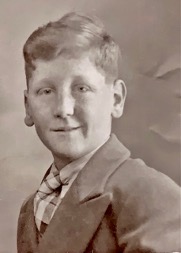 Young Derek
Young Derek
On leaving school Derek was employed as a trainee Mineral Water Factory Manager at Corona Fruit Drinks Ltd. He then did his 2 years National Service from 1948-1950 in the Royal Electrical & Mechanical Engineers.
After his two years in army uniform, Derek chose to continue wearing a uniform when he joined the Birmingham City Police in September 1951, where he served for 6 years until he successfully applied for and came out to Bermuda to join the Bermuda Police in February 1957 as an experienced police officer.
As Derek explains, “My [Bermuda] story begins at the offices of British Crown Agents in Milbank, London, England, in November 1956, where I was summoned for interview and medical following my application to join the Bermuda Police Force as it was then titled. Having successfully completed the interviews I was then sent to Harley Street, the home of Britain's leading medical specialists. Towards the end of the examination I was requested to show my teeth - to the horror of the eminent doctor - I was completely toothless, having had all my teeth extracted several months previously and awaiting the fitting of "National Health" dentures in the following month.
“I was nevertheless accepted and arrived in Bermuda in February 1957, designated as an 'Overseas Constable'. On arrival, after a 14 hour plane journey, I was posted to Central Division, City of Hamilton. At that time all 'Overseas Constables' were required to be unmarried, so I was to be billeted at the Single Mens' Quarters, located on Victoria St. in the old staff quarters of the (subsequently) burnt-out Hamilton Hotel, (an area now occupied by City Hall Car park) which proved to have no vacancies.“
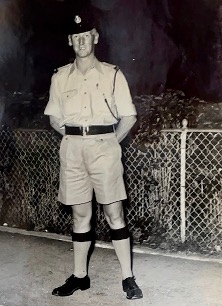 P.C. Derek Fletcher in khaki uniform
P.C. Derek Fletcher in khaki uniform“I was temporarily accommodated at the "American House Hotel" then located at the junction of Queen St. and Church St, where the Boyle Building now stands. The quarters consisted of single bedrooms, communal kitchen and dining room, and a bar and recreation room, restricted soley to the residents (who at that time were all white expatriate males). Locally appointed Police Constables (the majority of whom were black) were only permitted access on invitation of a resident. This situation was compounded by the inequality of conditions of service between the two groups, in that although all were entitled to 3 weeks Annual Leave, the overseas personnel on serving for 2 years were entitled to have their vacation time doubled, (i.e. - take 3 months off) whilst the local members were restricted to the lower amount of leave, regardless of if they went abroad. This was a hangover from the days when 'overseas members' traveled by sea to their destination, a matter of a 10 days voyage each way.”
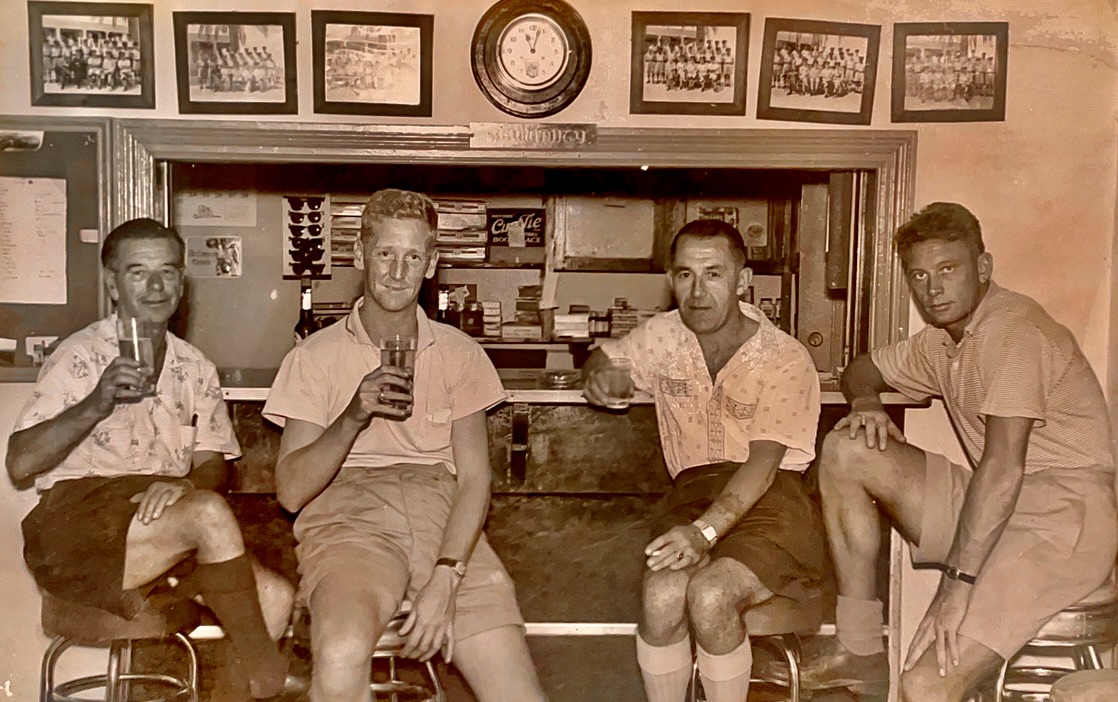
This was before the Bermuda Police had their own Training School, but the Police occasionally held refresher courses and brought out an experienced police training officer from the UK to deliver the courses. We believe the photo below is of one such training course and amongst those in attendance is young P.C. Derek Fletcher.
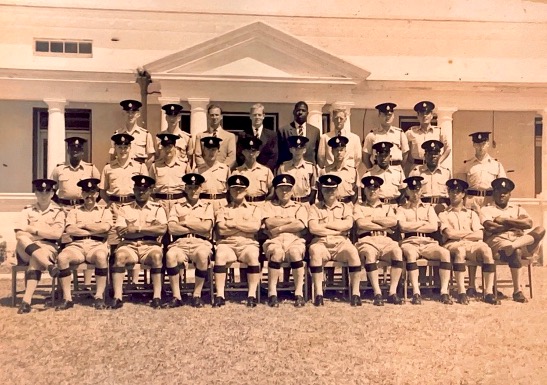
Derek’s first posting was to Central Division where he spent 10 months on the beat patrolling Hamilton. Having spent 6 years in the Birmingham City Police in England he was already an experienced officer.
His prior experience was demonstrated in December 1957 when he received a commendation "For vigilance and persistence in effecting the arrest of a youth which led to the clearing up of a case of shopbreaking." Derek later received a second Commissioner's Commendation in November 1962 "For keeness and initiative displayed in the arrest of a man for attempting to steal from motor cars."
After just 10 months in Hamilton he was transferred to Western Division, Somerset, in April 1958, as a detective in CID – the only posting he ever worked where he was not in police uniform.
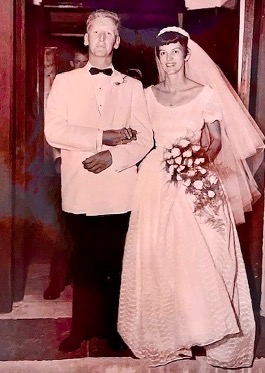 Derek and Helen on their wedding day - 1958
Derek and Helen on their wedding day - 1958
It was while working in Somerset that Derek married the love of his life, Miss Helen Hill, on 4th September 1958.
By 1958 Derek was a contributor to the Police Magazine which started publication in 1955. (CLICK HERE to view our collection of police magazines which are now in the process of being made available here on our ExPo website.) Derek wrote the Central Division Notes in the 1955 Winter edition and he had good reason to write about two very significant events that occurred on 4th September that year, one of which lit up the night sky when a disastrous fire completely gutted the Bermudiana Hotel overlooking Hamilton Harbour.
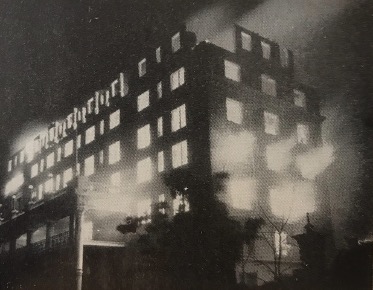 Catastrophic fire at Bermudiana Hotel - 1958
Catastrophic fire at Bermudiana Hotel - 1958
In his Central Division notes Derek wrote that “if anyone cannot remember the time and date of when the (Bermudiana Hotel) fire started, they could ask him for the answer - 4.50pm on Thursday, September 4, 1958 – which happened to be the day of my wedding which all but came to a halt because the whole Police Force was called out in the emergency.” As Derek explains, “The fact that I made the wedding – 30 minutes late - is due to the kind consideration shown to myself and three colleagues by the Commissioner and Senior Officers. We felt like singing ‘Feeling ever so lonely’ as we were the only policemen present - most unusual at a police wedding in Bermuda.”
Derek described the momentous move that occurred when the Police Headquarters, which had been located in Hamilton Police Station on Parliament Street, was moved to Prospect. In his words, “In 1959 the Police H.Q. moved from its location in the Hamilton Police Station on Parliament St. to the vacated British Army Compound, Prospect, Devonshire, with the added privilege of taking over the Army Officers' Mess there located as the Police Recreation Club. As a result of this move all Police Officers became members, (local and overseas) with the result of all having equal privileges; This, to my knowledge, being the first fully integrated social club in Bermuda - although due to outside situations the various sports sections remained separated for several more years until the amalgamation of the various national sports bodies.”
“The Police Club organized various committees to run the operation, one of which was an Entertainments Committee, of which I was privileged to be chairman, and we proceeded to organize our first social event, a dance, to which all members were invited as well as many civilian guests. It proved to be an unqualified success, to be followed in later years by many other unrestricted functions - another first for the members and Bermuda at large.”
“Although up to this time there was an inequality of privileges amongst overseas and local personnel, there was a very close personal relationship amongst both parties, who worked harmoniously together, both in their duty time and free periods. I was the grateful recipient of mentoring and personal friendships from a number of Bermudians, the late Oliver (Vic) Trott, Maurice (Syke) Smith, and Leon Bean to mention but a few of my deceased friends and mentors. Also must be included is gratitude to retired Commissioners of Police F.C. (Penny) Bean Q.P.M. and L.M. (Nobby) Clarke Q.V.M., Q.P.M. who both went out of their way to assist me at crucial periods of my service.”
In an article written by Derek titled “BIG-BANG BAN” he describes an horrendous crime committed in Warwick Parish related to the annual Guy Fawkes Night celebrations which plagued the Island for many years:-
“The date was 5th November 1959, ‘Guy Fawkes Night’. The location was Cedar Hill, Warwick Parish. The characters were groups of local "tweenies" and older teenagers; Jeremiah Sergeant, a shopkeeper and local character of West Indian heritage; and several Bermuda Police Officers, and their patrol car.
“A call was received in mid-evening at Police H.Q. of a disturbance at Cedar Hill, Warwick. Myself and my C.I.D. partner, the late Asst. Commissioner of Police Maurice (Syke) Smith, (at that time a Detective Constable), and Traffic patrol crew Harry Lister and Hilton Wingood were dispatched to the area.
“A group of local teens and 'tweenies had decided to demolish the windows of Jeremiah Sargent's variety store and residence, by throwing rocks and bricks at the house as part of their "Guy Fawkes Night" celebrations. Not content with the damage caused thus far, the older teens, who had obtained a supply of dynamite sticks for the occasion, complete with fuses, proceeded to toss them through the then damaged windows. This action caused major damage to floors, furniture and showcases.
“The following article appeared in the next day's edition of the Royal Gazette:-
"Explosion Wrecks Cedar Hill Shop"
A shop comprising part of Mr. Jeremiah Alexander Sergeant's home on Cedar Hill, Warwick East, was severely blasted by an explosion last night, allegedly by a group of 20 youths.
“The casement window in the front of the store was completely shattered. The front was blown off the counter and not one piece of glass was left whole in the showcase. The explosion also caused a hole in the floor, measuring approximately six by seven inches. Comparatively little of the stock, which mainly consists of groceries was damaged, although the entrance looked a shambles. Mr. Sergeant, interviewed by a Royal Gazette reporter early this morning, said that a gang of youths smashed the window of the store at about 9.p.m. He went to a neighbour's house to telephone the police. While there he heard an enormous' explosion. "There goes my house" he remarked at the time. He said he knows those responsible for the action, since they had threatened to "blow the place up" a few days ago. Mr. Sergeant gave his occupation as a debt collector, commercial photographer and shopkeeper. He said he was also in the real estate business and held a license as a public auctioneer. He added his shop to his house in August this year, and carries a variety of goods.
“He came to Bermuda in 1930 from St. Kitts, but was born in the Dominican Republic. He was alone in the house at the time, since his wife has been away since June.
“Police officers were still investigating the explosion in the early hours of this morning. Not content with the damage caused at this single location the youths then proceeded to toss dynamite indiscriminately throughout the area. One stick struck a roadside sign, causing it to disintegrate and a piece struck the arm of an innocent person sitting on the verandah of a nearby house, causing a wound requiring many stitches; another was thrown under the parked police vehicle containing the two uniform officers investigating the incident, fortunately they chose that exact moment to move their location, and the result was a rather impressive 'pot-hole' in the road surface only.
“The history of these acts of vandalism stemmed from the bad relationship between the main victim (Sergeant), and the youth of the area. He was what may be described as an "Old Curmudgeon”, and continually berated the youth of the area for their actions and behaviour. Their relationship had been for a long time belligerent and confrontational.
“The perpetrators of these acts were subsequently charged and appeared in Magistrates Court, facing a whole host of charges for with they received various penalties consisting of periods of correction at the (then) Senior Training School to periods of probation.
“An amusing side-bar to the events that night was that Mr. Sergeant, who was also employed as a "Greeter" on weekends at the "Empire Room" Night Club, Queen St, City of Hamilton, was already fully arrayed in his customary garb of top hat, tails, and white bowtie which he always wore for these duties, this among all the carnage and confusion of the evening. He would wear this uniform even to ride his pedal cycle into town, complete with two sets of cycle clips and safety pins to support his 'tails' from damage.
“The subsequent outcome of the whole affair was that legislation was eventually enacted in the House of Assembly banning all fireworks and explosive material to be sold, or possessed throughout the island. In more recent years it has been relaxed somewhat, in that Government Licensed personnel may now put on "Firework Displays" on special occasions and locations.”
Derek was promoted to Sergeant on 1st November 1963 and remained in Central Division at Hamilton Police Station until he was transferred to Police Headquarters where he served in Administration. Derek went on to serve as a Watch Sergeant and Station Sergeant in Hamilton and in Western Division, and was Senior Divisional Sergeant at the time of his retirement in March 1981.
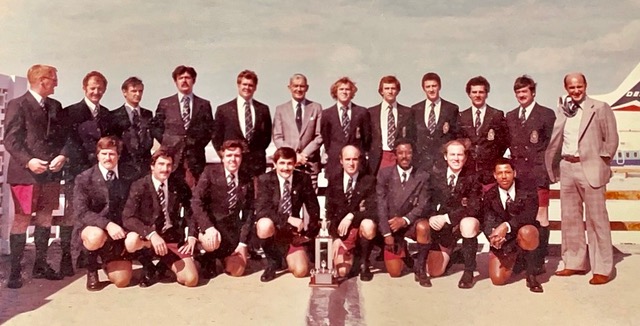
During his time in the Bermuda Police, Derek was always an active participant in social activities. In addition to his work as Chairman of the Police Entertainments committee, and as a contributor to the Police Magazine, he also served on the Police Boxing Committee, and was a football referee. He was a member of the Hamilton Lions Club and served on the Executive Committee of the Senior Learning Centre. He was also actively involved in the Atlantic Phoenix Lodge, Prince Alfred Lodge, Bermuda installed Masters Lodge, the District Grand Lodge of Bermuda, serving as Chaplain of the three Lodges.
Not content with sitting at home as a civilian, Derek joined the Bermuda Reserve Constabulary within a month of his official retirement in April 1981, and 6 months later he was promoted to the rank of Reserve Inspector on assuming the role of Executive Officer of the Reserves in October 1981, where he was able to utlilize and pass on his many years of police experience to the Reserves.
In August 1981 Derek became the Assistant Storeman at Police Headquarters where he served for 5 years before transferring to the Supreme Court as the Court Attendant. He finally retired in June 1994.
Derek was also actively involved in church activities and since Palm Sunday in 1993 he served as a Licensed Lay Reader in St. Mary’s Church.
Unfortunately, while serving in the Police Force, Derek had a problem with alcohol that no doubt hindered his promotion prospects, but in November 1980 Derek reached a critical point in his life, when things came to a head after he turned up for night duty in Hamilton much the worse for drink. He was relieved of his duties and sent home.
Several days later he was summoned to appear before a Board of Senior Officers, including Deputy Commissioner F.C. “Penny” Bean, the Police Welfare Officer. Prior to this incident it had been Service policy to deal with such matters through disciplinary action which would inevitably lead to dismissal. However, in a reversal of the previous policy, Derek was offered the opportunity to attend a rehabilitation course for treatment. In Derek’s own words he was the first “guinea pig” to be offered the option of undergoing treatment - and the result was remarkable. Derek not only completely gave up alcohol, never to drink again, but he also became an exceptionally effective AA counsellor who established a great reputation for helping others afflicted with alcoholism. He was the first police officer to be offered treatment and he certainly made the most of the opportunity to start afresh, so much so that it became the official policy for the Service to offer treatment to other members of the Service. Derek had always been willing to help others, and he was able to fully utilize his talents to do community service and to help others need.”
In looking back on his career Derek wrote, “I believe that the situation of ‘integration’ within the Bermuda Police Service has for many years been a shining example of what can be achieved by patience, understanding, and camaraderie amongst all involved, this is not to say there have not been or continue to be pockets of misunderstanding and dissent, for to err is human, but I firmly believe that overall the Bermuda public, some of whom for their own selfish reasons may disagree, have a right to be proud of the records set by "Bermuda's Finest" and I, for one am proud to call myself a retired member.
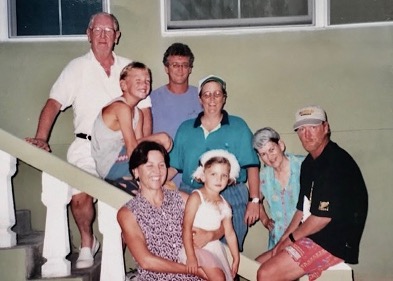
Sadly, Derek passed away on 24th September 2008.
Editors notes - I arrived in Bermuda as a young PC in 1964, and 6 months later Derek and Helen kindly invited me to their home on Alexandra Road, Prospect, for my first Christmas dinner in Bermuda. Their home was a hive of activity with their three young children, 4 year old Rees, and 18 months old twins. Elizabeth and Kevin. Helen cooked a superb meal complete with turkey and the trimmings - a real treat for a young single man living in the barracks at Prospect - including something on the menu that had me puzzled! It was, of course, cassava pie and I’ve had it just about every year since then. I had worked in South Staffordshire near to Birmingham so Derek had reached out to me as a fellow Midlander to make sure I was settling in to life in Bermuda. I always found Derek to be a kind and considerate Sergeant with an excellent knowledge of the law and a great sense of humour.
Sections of several of the comments quoting Derek Fletcher (in italics) in the above article were originally published by the Senior's Learning Centre, Bermuda College, in their collected volume Legacies. Permission to republish courtesy of the Lifelong Learning Centre."